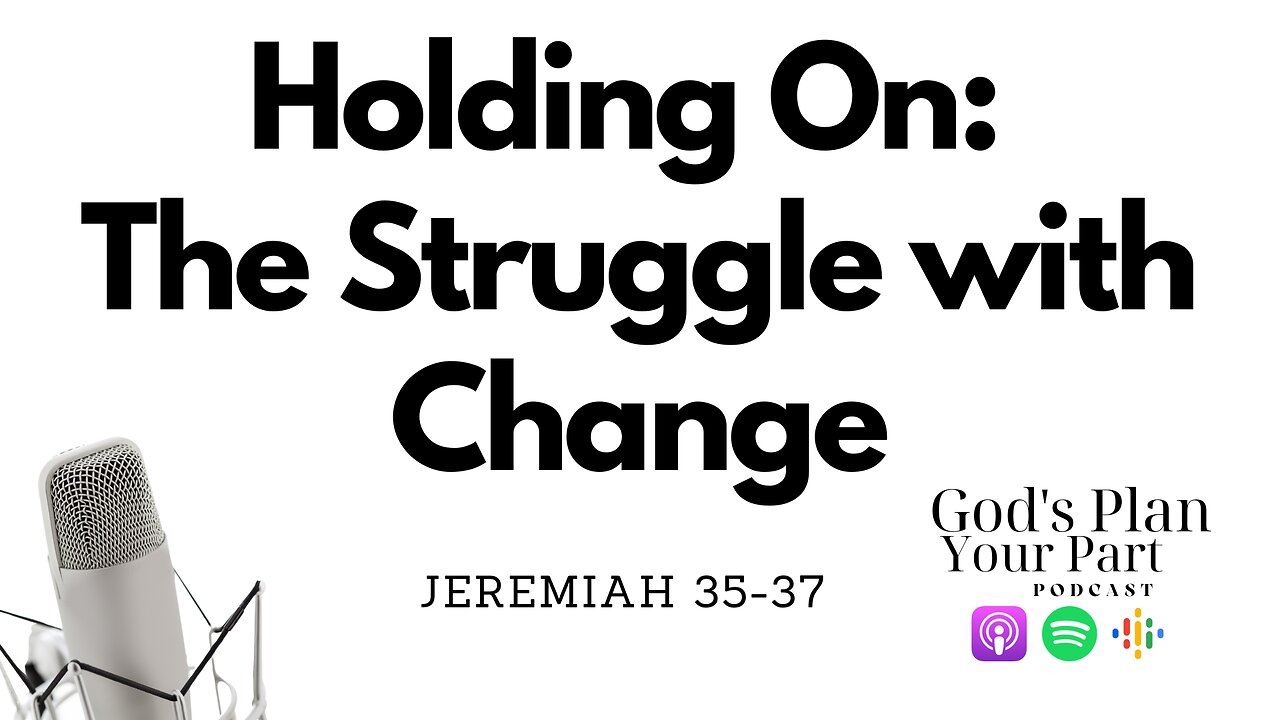Premium Only Content

Jeremiah 35-37 | Scrolls of Change: Embracing Transformation in the Midst of Uncertainty
For today's full reading download the full podcast.
Listen on Apple Podcasts: https://podcasts.apple.com/us/podcast/gods-plan-your-part/id1662005086
Listen on Spotify: https://open.spotify.com/show/2IjaYq4cYgy8WIcw5zWj9g
Listen on Google Podcasts: https://podcasts.google.com/feed/aHR0cHM6Ly9mZWVkcy5idXp6c3Byb3V0LmNvbS8yMTA1NzUyLnJzcw==
Instagram: https://www.instagram.com/godsplanyourpart/
Facebook: https://www.facebook.com/godsplanyourpart/
Support the Show: https://www.buzzsprout.com/2105752/support
Contact us: godsplanyourpart@gmail.com
#podcast #God #dailybible #bibleinayear #dailybiblepodcast #christianity #faith #bible #love #christian #biblestudy #bibleverse #scripture #godsplanyourpart
In Jeremiah 35, the story of the Rechabites stands as a poignant testament to their unyielding commitment to their ancestor Jonadab's command not to drink wine. This unwavering obedience serves as a sharp contrast to the waywardness of the people of Judah, who consistently disregarded God's commandments. The chapter emphasizes the importance of faithfulness, as the Rechabites' loyalty is rewarded while the disobedience of Judah leads to grave consequences. Through this narrative, the significance of obedience and the correlation between actions and outcomes are vividly portrayed.
Jeremiah 36 delves into the intricate role of Baruch, Jeremiah's scribe, as he meticulously transcribes the prophet's messages onto a scroll. This scroll contains prophecies of judgment and calls for repentance, conveying God's divine intentions for His people. However, when King Jehoiakim hears the scroll being read, he responds with defiance and disbelief. His reaction symbolizes the nation's stubborn rejection of God's word and their unwillingness to acknowledge their need for spiritual correction. Jehoiakim's destructive act of burning the scroll underscores the tragic consequences of dismissing divine guidance and highlights the importance of embracing God's instructions.
Chapter 37 brings the focus to the beleaguered city of Jerusalem during the reign of King Zedekiah. As Babylon's grip tightens around the city, false prophets offer false hope to Zedekiah, assuring him of a victorious outcome. Amidst this atmosphere of uncertainty, Jeremiah remains imprisoned for his unwavering proclamation of Babylon's impending conquest. Zedekiah's dilemma encapsulates the tension between human desires for deliverance and the inevitability of God's judgments. The brief respite from the Babylonian siege when the Egyptian army advances illustrates the fragile nature of political alliances, ultimately underscoring Jeremiah's steadfast message of Babylon's eventual return. This chapter serves as a reminder that relying on worldly alliances over divine truth can lead to disappointment and further emphasizes the prophet's unwavering commitment to God's calling, even in the face of resistance and suffering.
The narrative of Jeremiah 35-37 serves as a powerful allegory for the human struggle to embrace necessary change even when it is evident that change is required. The vivid contrast between the Rechabites' obedience and Judah's stubbornness serves as a reminder that acknowledging and acting on the need for change, even in the face of uncertainty, can lead to growth and positive outcomes. Just as Jeremiah's steadfast commitment to his prophetic role amidst adversity sets an example, recognizing the need for change and actively pursuing it can lead to a more meaningful and purposeful life.
-
 14:39
14:39
Gods Plan Your Part
4 months agoTitus 1 | Paul’s Blueprint for Faithful Leaders
391 -
 LIVE
LIVE
I_Came_With_Fire_Podcast
6 hours agoDEPARTMENT OF EDUCATION AXED | GAZA ULTIMATUM
361 watching -
 2:16:53
2:16:53
FreshandFit
3 hours agoCall-In Show
38.3K6 -
 4:27:46
4:27:46
Nerdrotic
7 hours ago $5.62 earnedDaredevil Born Again REVIEW, Harry Potter Show DOA, DC HACKED! | Friday Night Tights 344 Paul Chato
108K33 -
 1:15:15
1:15:15
Glenn Greenwald
4 hours agoWeek in Review: Lee Fang and Leighton Woodhouse on Ukraine War and NYT Piece Revealing Tensions within Trump Admin; PLUS: Lee Fang Takes Audience Questions on DOGE and Big Tech | SYSTEM UPDATE #420
53.9K36 -
 1:03:30
1:03:30
Sarah Westall
6 hours agoMassive Government Overhaul: FBI, CIA, IRS and more to be Gutted w/ Sam Anthony
53.3K13 -
 1:07:40
1:07:40
IsaacButterfield
6 hours ago $0.39 earnedAustralia Under Attack | Trump's State of the Union | All LGBTQ Cast (W Guest Frenchy)
27.7K4 -
 1:23:37
1:23:37
Edge of Wonder
6 hours agoIs Your Car Collecting Your Biodata? Whistleblower Exposes Dark Agenda
29.1K2 -
 2:08:50
2:08:50
Quite Frankly
9 hours ago"A Rat at HHS, Gene Hackman, Musical Extras" ft. J Gulinello 3/7/25
34K7 -
 55:49
55:49
LFA TV
1 day agoGermany Started Two World Wars and Now Wants Nuclear Weapons | TRUMPET DAILY 3.7.25 7PM
31.2K24